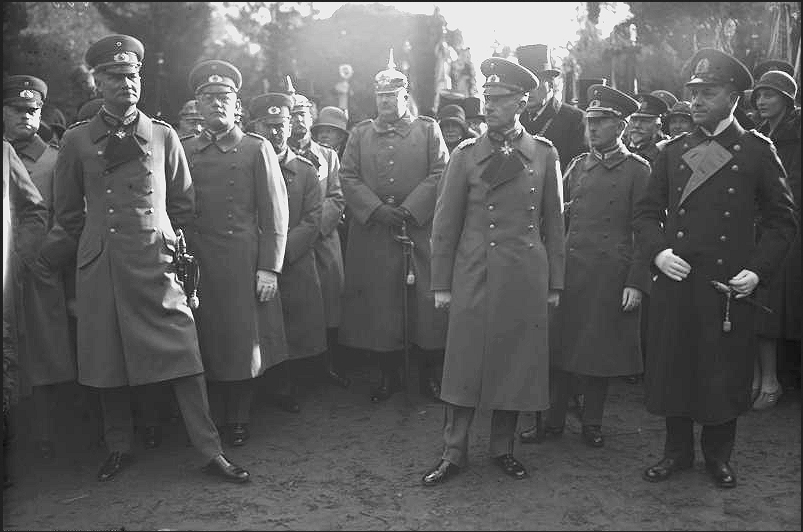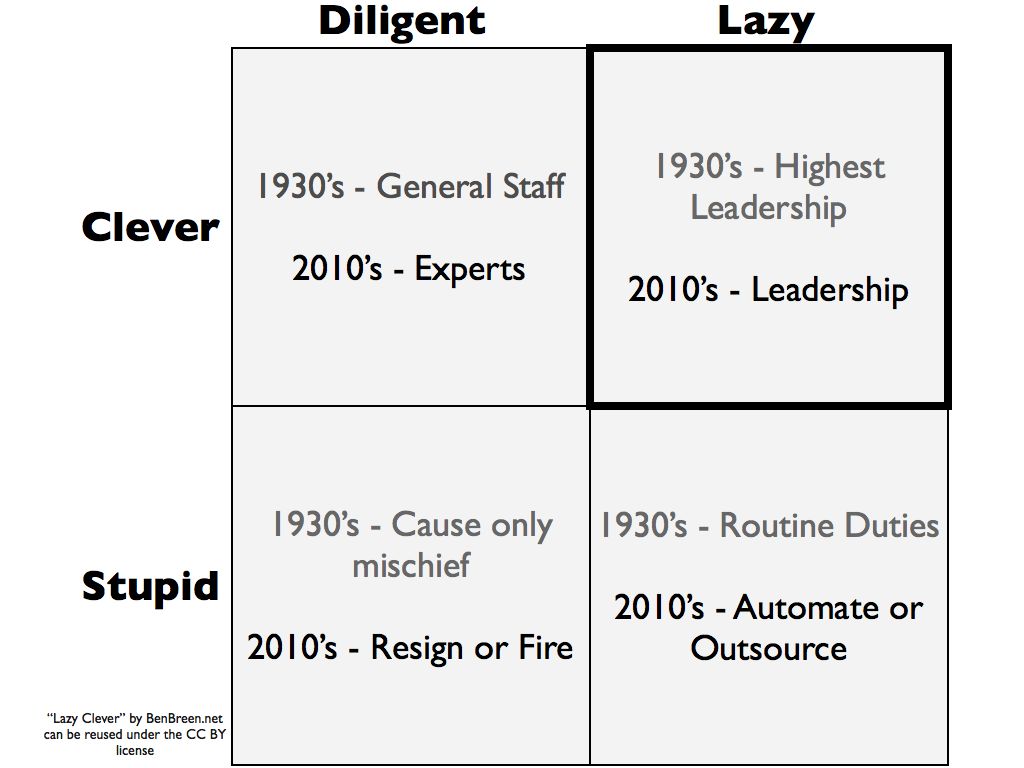Why Clever and Lazy People Make Great Leaders

During World War II, Field Marshal Erich von Manstein was held in high esteem by his fellow officers as one of the German Wehrmacht‘s best military strategists.
Von Manstein once described Germany’s former peacetime Chief of the Army High Command as “…probably one of the cleverest people I ever met“. That Commander’s name was Kurt von Hammerstein-Equord.
Von Hammerstein-Equord “had a reputation for independence and indolence, favouring hunting and shooting over the labors of administration.” His opposition to Hitler meant he was forced to resign his office in 1934.
Both men are widely credited with having said:
I divide my officers into four groups. There are clever, diligent, stupid, and lazy officers. Usually two characteristics are combined. Some are clever and diligent — their place is the General Staff. The next lot are stupid and lazy — they make up 90 percent of every army and are suited to routine duties. Anyone who is both clever and lazy is qualified for the highest leadership duties, because he possesses the intellectual clarity and the composure necessary for difficult decisions. One must beware of anyone who is stupid and diligent — he must not be entrusted with any responsibility because he will always cause only mischief.”
For our purposes it makes no difference who said it but Wikipedia attributes the quote to Von Hammerstein-Equord.
Let’s take a closer look and see how these groupings apply to business organisations in the 21st century.

A word of caution first: we’re talking here about broad behaviours in a certain context. We’re not labelling people.
Stupid and Lazy
Von Hammerstein-Equord reckoned that 90% of his staff were both stupid and lazy and he gave them routine duties. How does this apply to our business organisations today?
The routine work that used to be carried out by stupid and lazy people is increasingly being either automated, outsourced or crowdsourced. In other words it makes less and less sense to directly employ stupid and lazy people.
If someone is stupid and lazy in what they do today, what should he do? I would suggest he switch to something he is clever at. Quick, before his job is automated or outsourced.
A quick and easy way to do this? Try your hand at crowdsourcing. I’m sure Amazon’s Mechanical Turk service would be delighted to accept you as a worker. But beware, the crowdsourcers are getting hot on rating their ‘workers’. So, if you don’t get clever pretty soon you’ll be cast aside there too.
On the flip side, as a business owner with routine tasks to be done, it’s worth checking out crowdsourcing sites like Amazon Mechanical Turk.
Hardworking Idiots
Von Hammerstein-Equord believed that these people cause “nothing but mischief” and should be fired immediately.
Unfortunately, I’ve come across far too many people who are diligent but stupid, and I bet you have too.
I’ve worked at several places that see themselves as prestigious, high paying and where lots of people want to work. This is where I’ve seen the practise known as ‘face time’. This is where people deliberately get in early, stay at their desks all through lunch and leave late. Just to be seen by the boss as ‘being busy’. In fact most of them would be surfing the web or chatting with their pals as soon as the boss was out of sight.
What these people work hard at is keeping up the appearance of being busy. Often this means inventing pointless work for themselves or others, so called busywork. Many of these people may in fact be lazy as well as stupid – the effect is the same. It’s all about creating the impression of working hard.
Why do they do it? It’s the factory mindset at work. A hangover from the Industrial Age attitude to work where you are not a good worker unless you are flat out, all the time. Shovelling coal into the hot furnace. Churning out widgets as fast as possible. This factory mindset carried over into office work, hence the need to be seen to be busy all the time. If this is the sort of business you’re in then your job will be automated or outsourced in any case.
The problem is made worse by the Peter Principle. This is where an employee “tends to rise to their level of incompetence”. This is spurred by the factory mindset. It explains why someone who is a perfectly good developer gets promoted to become a line manager. I’ve seen it many times. That person is then transformed from being clever to stupid. However hard they work or appear to work, they remain an idiot because management is not what they’re clever at. The cycle repeats and before you know it you’re surrounded by idiots all trying to look busier than each other.
Any work that does get done by these people is at best pointless and ineffective. No wonder Von Hammerstein-Equord refused to give these people the time of day.
What to do with them? Reassign them so they are doing something they are clever at. Instead of ‘promoting’ a great developer to be an idiot middle manager then give them more recognition and reward for being and staying a clever developer. If you can’t help them to become clever then they’ll have to go. It’s them or you.
Clever and Diligent
We all want to work with people who are both hardworking and clever. Don’t we?
Von Hammerstein-Equord put these people on his General Staff. Today that roughly translates as middle management.
These are the sort of people, factory-minded (especially white-collar) organisations traditionally want working for them. Safe. Reliable. Cogs in the machine, keeping everything running smoothly. They faithfully follow instructions and don’t ask difficult questions.
The trouble is that their compliance allows them to deny responsibility. And without responsibility they are not going to ask the difficult questions, take risks, to fail, to open doors to new opportunities, and therefore to succeed.
The other problem is that if you’re constantly working flat out, at 100 miles per hour, you don’t have time to think, and reflect. You’re not allowing yourself the space and the time to create. To come up with new ways of doing things, making new connections, and moving forward.
In our ever more complex, fluid and decentralised world we need people who are willing to take responsibility, to fail. To stand out, not fit in. To deliver unique creativity. To make new connections. To make their own maps of what to do next. To lead customers and to inspire the team.
Difficult for a compliant, busy cog.
The need for traditional middle line management is fast disappearing. Those that remain need to get good at leading. Leading customers and inspiring staff.
Clever and diligent do however make for good experts. Experts have deep domain knowledge. Experts can come in and solve a specific problem. Either alone or as part of a project team.
The best experts are free agents (self-employed), not least because hardworking idiot line managers insist on ‘promoting’ fledgling experts to join their ranks!
Clever and Lazy
According to Von Hammerstein-Equord, someone who is “clever and lazy is qualified for the highest leadership duties, because he possesses the intellectual clarity and the composure necessary for difficult decisions.”
These people insist on taking the time and space required to create, and to find new ways forward.
They are natural delegators.
They are always looking for simpler, easier ways to do things.
They focus on the essentials, and they despise ‘busywork’.
There are others of course but these are some of the key ingredients the world needs now from leaders more than ever.
It strikes me that Von Hammerstein-Equord’s words are as relevant now as they were in his day.
What do you think?